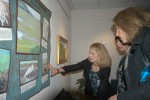The Long Term Ecological Research (LTER) Network recently held its Executive Board Meeting and of much greater general interest, the 12th annual spring mini-symposium at the National Science Foundation (NSF) headquarters in Arlington, VA, from 27 February through 1 March 2013. The topic of this year’s mini-symposium was, "The Globalization of Long Term Ecological Research," which was selected to highlight the 20th anniversary of the founding of the International LTER Network. That event occurred during the 1993 All Scientists meeting in Estes Park, Colorado. The 2013 mini-symposium was organized by Kristin Vanderbilt with help from Dan Childers (CAP), Evelyn Gaiser (FCE), and John Chamblee (CWT).
There were seven outstanding presentations at the symposium. Speakers included Kristin Vanderbilt (SEV and co-Chair of U.S. ILTER Committee), Mark Williams (NWT), Megan Woltz (KBS), Saleit Ron (Israel LTER), Byron Adams (MCM), the incomparable John Porter (VCR), and Tiffany Troxler (FCE). All of these informative and engaging presentations can be viewed at http://bit.ly/126ks5H.
In addition to our highly successful mini-symposium, those LTER scientists whose computers didn’t crash met with staffers from their Congressional districts on the morning of March 27. The purpose of these visits was to reinforce the importance of federal funding for research and to provide congressional staffers with examples of how long-term ecological research and education benefits the citizens of their districts.
This type of Congressional outreach is very important given that much of our research funding comes directly or indirectly through federal sources. We are grateful to our friends at the American Institute for Biological Sciences (AIBS) for their assistance in setting up these meetings and providing detailed statistics regarding NSF funding at the State level, which the scientists shared with congressional staff during their visits.
During our time at NSF, we also had highly productive interactions with NSF staff regarding the structure and purpose of LTER site visits, LTER interactions with the National Ecological Observatory Network (NEON), LTER-ILTER interactions and developments, the status of the Network Information System, LTER synthesis activities, and opportunities for international research and collaboration. More information regarding site visits will appear in the minutes of the Executive Board meeting that will be published in mid-April. Also we will schedule a larger group discussion between NSF staff and LTER scientists about the structure of site visits at our upcoming Science Council meeting in Las Cruces hosted by our good friends at the Jornada LTER.
One of the highlights of the Executive Board meeting at NSF was the signing of a Memorandum of Understanding between the U.S. LTER Network and the French LTER Network, known as the Zone Atelier (ZA-France), which was held at the French Embassy on the evening of February 27. I signed the MoU on behalf of the U.S. LTER Network and Xavier Morise, Director of France’s Washington based National Center for Scientific Research (CNRS) office for North America, signed on behalf of the President of the CNRS.
The signing ceremony included presentations by me (in a suit but without PowerPoint slides) and Yvan Lagadeuc (in jeans and a sports coat but with PowerPoint slides). Yvan is from the University of Rennes and is the former director of ZA-France, but is currently on sabbatical at the Massachusetts Institute of Technology. The ceremony was surprisingly well attended. After the formalities, everyone gathered for a lovely reception hosted by the Embassy
Another excellent highlight of the Executive Board meetings during the afternoon of February 28 was the grand opening of the 2nd Ecological Reflections exhibit on the 3rd floor of the NSF building. This exhibit will remain in place for three months and will be viewed by NSF staff and hundreds of visitors, including panelists kicked out of proposal discussions because of conflicts of interest.
Like last year, this exhibit was facilitated by the kind and dedicated efforts of Gayle Pugh, a Program Analyst in Biological Oceanography at NSF. Saran Twombly, the LTER Program Director at NSF, generously provided the refreshments that fueled the festivities. Fred Swanson (AND), one of the key movers and shakers behind the Ecological Reflections movement, (http://www.ecologicalreflections.com/) gave a nice opening presentation to the audience. Thanks to the wonderful and tireless efforts of Cheryl Dybas from the NSF Office of Legislative and Public Affairs, the event was widely publicized and attended, including a reporter from Science magazine who published a nice little shout-out to this side of LTER Network (http://bit.ly/Z3Z7Tc)
As mentioned previously, next up is the annual LTER Science Council meeting being hosted by the Jornada LTER from May 14-17. During the meeting, we will have the good fortune to reprise some of the mini-symposium presentations, along with other talks, witness the brief return of the one and only Jim Gosz, enjoy an afternoon field trip to the Jornada LTER field sites, and wind down with a barbeque where carnivorous scientists can sample locally sourced, exceptionally lean beef that has been foraging on desert grassland suffering from a decade long drought. I look forward to seeing everyone who can make the meeting in New Mexico!
Scott Collins
Chair, LTER Science Council and Executive Board

 Enlarge this image
Enlarge this image

